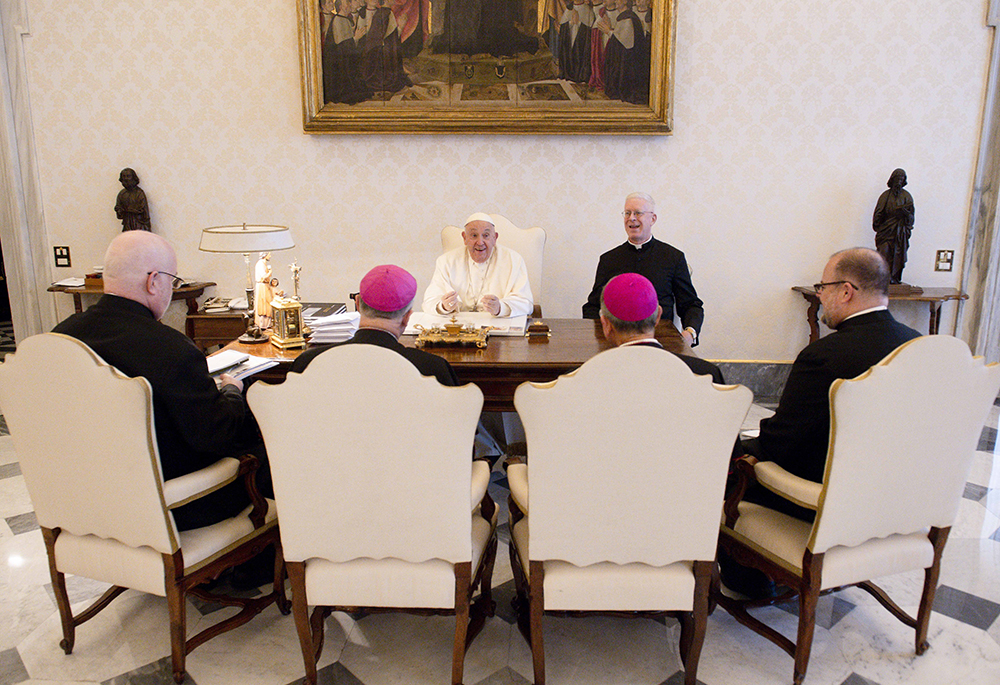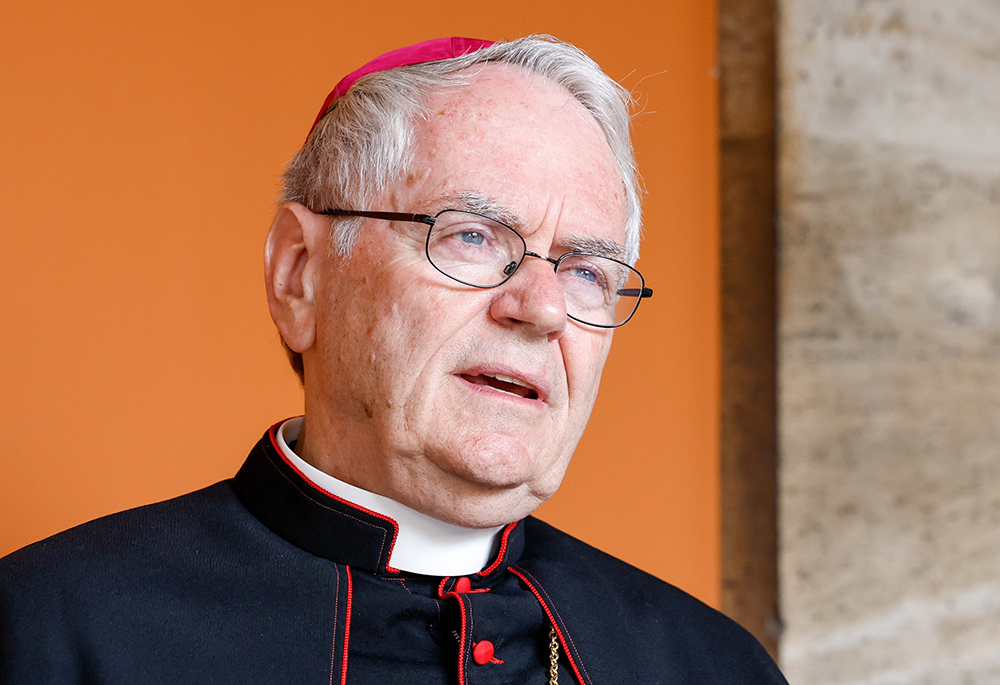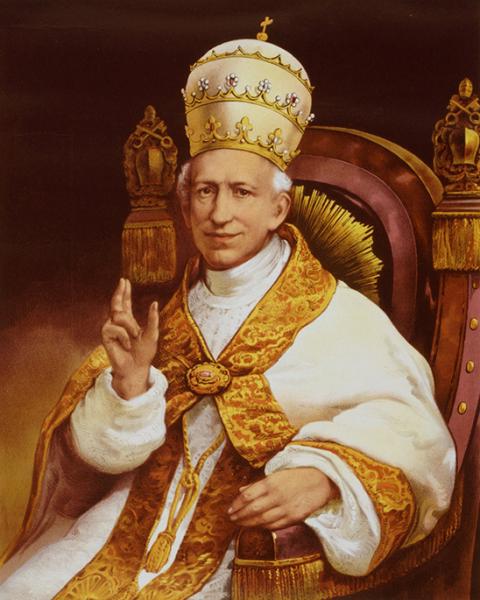
Pope Francis holds his spring meeting with the officers of the U.S. bishops' conference April 18 at the Vatican. Seated from left are: Fr. Paul B.R. Hartmann, associate general secretary; Archbishop Timothy Broglio, president and head of the U.S. Archdiocese for the Military Services; Archbishop William Lori of Baltimore, vice president; and Fr. Michael J.K. Fuller, general secretary. (CNS/Vatican Media)
Will the U.S. bishops continue to make social teaching a central part of their work as a conference, or not? And, will respect for the tradition of widespread consultation remain the norm at the U.S. bishops' conference, or not?
Several prominent U.S. bishops continue to raise questions about the decision by the leadership of the bishops' conference to slash the number of staff positions working in social ministry. Last month, we learned that as many as 12 staffers in the Justice, Peace and Human Development office were being fired or retired. That decision raised many disturbing questions I posed about the direction of the bishops' conference.
A memo sent to all the bishops on June 28, and leaked to Crux, raises more questions than it answers. It conflated the discussion about the Catholic Campaign for Human Development with consultation about these more widespread changes, it downplayed the number of cuts and their significance, claiming the cuts were necessary for financial reasons, and that "the work of advocating for sound policies based on the social teachings of the Church will remain strong, if not stronger." Call me silly, but how do you do more advocacy with a staff that has been cut in half?
Most bishops are concerned that the social mission of the church not be neglected. "I have been proud of the way the bishops of the United States have carried out our mission by standing with the poor, working for justice and pursuing peace," wrote Santa Fe Archbishop John Wester at America. "We have done so by sharing and applying the teaching of the Gospel and the principles of Catholic social teaching as pastors, teachers and leaders in our Catholic community of faith. Unfortunately, with all due respect to the leadership, I believe the U.S.C.C.B. is quietly taking extraordinary actions that curtail our sacred social mission."
Las Vegas Archbishop George Thomas seconded Wester's concerns.
"The timing is especially problematic," Thomas told me via email. "We are on the cusp of acrimonious elections. We are facing armed world conflict, incidents of noxious racism, extreme abortion proposals, congressional gridlock regarding immigration reform, and a host of other troubling societal issues affecting our people. Now, more than ever before, we need episcopal leadership informed by Catholic Social Teaching to serve as a lodestar as we pass through these turbulent waters." He added the hope that the changes "will be prayerfully reconsidered."

Archbishop George Thomas of Las Vegas talks about the experience of receiving his pallium from Pope Francis at a Mass in St. Peter's Basilica at the Vatican June 29, 2023, the feast of Sts. Peter and Paul. (CNS/Lola Gomez)
Archbishop Mitchell Rozanski of St. Louis told me the concerns extend beyond the internal discussions among the bishops.
"Since the staff cuts at Justice and Peace were announced, I have heard concerns from lay Catholics on the commitment of the bishops to the social ministry of the Church," Rozanski told me in an email. "It is concerning to me that, in light of the discussion on the CCHD, these planned staff cuts were not even mentioned at our meeting in Louisville."
This last point is vitally important. It isn't just that some bishops disagree with the decision to cut back on the Justice, Peace and Human Development office, while leaving other committees untouched. It is that the bishops feel like they were gaslighted at last month's meeting in Louisville.
"The cutbacks at USCCB caught me off guard," said Thomas. "The discussion and debate in Louisville concerning CCHD indicated significant support for the Church's social ministry. Therefore, I was surprised and disappointed by the lack of meaningful process leading up to these changes."
Wester, in his America article, voiced a similar concern, writing, "After my 26 years as a bishop, I am appalled that the U.S.C.C.B. would undermine a vital function without a process involving consultation and transparency." Archbishop Christopher Coyne of Hartford, Connecticut, was interviewed by my colleague Christopher White in Rome, where Coyne went to receive the pallium from the pope. Asked about the lack of consultation at the Louisville meeting, Coyne said, "At no point was any discussion made or talked about in terms of significant employee cuts. … It comes across as being somewhat duplicitous in terms of what was actually discussed with us as bishops and what actually happened."

Pope Leo XIII is depicted seated in an official Vatican portrait circa 1878. Leo's landmark 1891 encyclical Rerum Novarum ("Of New Things") focused on the changing conditions of work in a newly urbanized and industrialized economy. (CNS/Library of Congress)
The social engagement of the U.S. bishops goes back a long way. It is not merely a matter of bringing papal social teaching to the local church. Cardinal James Gibbons' 1887 memorial defending the Knights of Labor was one of the things that moved Pope Leo XIII to issue the seminal encyclical Rerum Novarum, the first exercise of the social magisterium, in 1891. Key members of the U.S. hierarchy — Gibbons, Bishops John Keane and John Ireland, as well as future bishop Fr. Denis O'Connell all worked on the memorial — had a role in galvanizing the Holy See into articulating social doctrine as a distinct form of moral teaching.
Although the U.S. metropolitan archbishops had met annually for many years to discuss issues of national significance, the bishops' conference itself grew out of the National Catholic War Council, which was set up to minister to the needs of the nation as it entered World War I. After the war, they changed the name to the National Catholic Welfare Council (later Conference) and the first document they issued, in 1919, was a plan for postwar social reconstruction based on principles of Catholic theology. That text was the work of Fr. John A. Ryan, who would shape the work of the conference in its first decades and become an adviser to, and supporter of, Franklin Delano Roosevelt. The New Deal overlapped with the vision of the 1919 document the bishops had approved.
Advertisement
All this is to say that the social teachings of the church were not one thing among many that the bishops' conference did. They were the raison d'etre of the conference. For over 100 years, the conference applied the church's teachings to social and political issues of the day in a series of pastoral statements and advocacy work which, taken together, showed the perpetual relevance of that teaching to the problems of our society.
The thing the bishops have not been so great at is making those social teachings central to our internal catechesis, which is why Catholic social doctrine is known as the "church's best kept secret." Catholic social teaching is often presented as a kind of add-on, not something integral to the faith. If anything, the bishops need more resources to figure out how better to integrate our social teaching with our catechesis, not less.
It is not clear where the bishops go from here. By the time they meet in November, the dismissed staff will have been gone for over three months. Even if the pink slips were recalled today, who would entrust the future of the department to the leadership that already tried to cripple it once? It will be another year before elections for new leadership of the conference. This sense that the leadership has been "somewhat duplicitous" should certainly make the bishops seek new leadership in 2025. Then, and only then, can the conference be rebuilt from the shell it is fast becoming.




